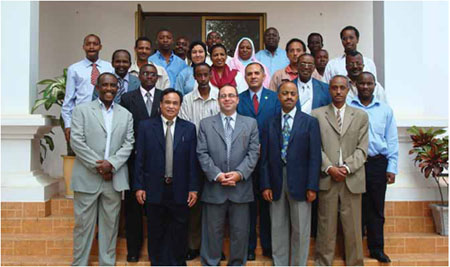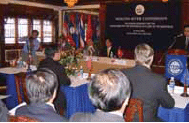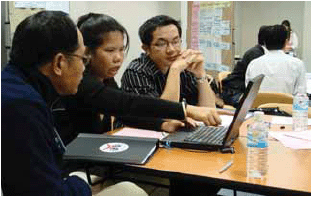2007 Events in Brief

Third South East Asia Water Forum
One of the most important regional water resource management
events on the 2007 calendar was the third South East Asia Water
Forum, held in Kuala Lumpur, Malaysia in October. The conference
theme was “Consolidating Actions towards Effective Implementation
of Integrated Water Resources Management (IWRM): What Have We
Done? What More Shall We Do?” Two sessions at the forum were
chaired by the MRC, on the subjects of Flood Mitigation
in a Development Context - Examples and Lessons from the Mekong,
and on Sustainable Development Challenges: Climate, Drought
and Water Management.
Over 350 delegates from 18 countries around the world came to the biennial meeting to discuss development and implementation of IWRM approaches for sustainable development. The climax of the forum was the Putrajaya Ministerial Declaration ministers responsible for water resources in all 10 ASEAN countries formally declared their intention to work together to push for IWRM. The Declaration recognised the importance of water in social and economic development and the role of IWRM approaches in responding to the challenges presented by climate change.
Nile Basin countries learn from MRC
experience
In October the MRC hosted a six-day study tour from 26 members
of the Nile Basin Initiative (NBI), representing nine African
nations. The delegates from Burundi, the Democratic Republic
of Congo, Egypt, Kenya, Rwanda, Sudan, Tanzania and Uganda came
from the Initiative’s Water Resources Planning and Management
Project, which aims to enhance technical and analytical capacity
to support the development, management and protection of the
Nile Basin’s water resources.
One of the three technical components of the visitors’ project is a decision support system, and, as the MRC has good experience of such systems through its own Decision Support Framework, the African delegates were especially interested in learning how MRC goes about achieving basin-wide communication, information management and analysis of river basin resources. In an intensive two days of presentations and demonstrations from MRC programme staff, the NBI delegation had the opportunity to learn more about how the programme work is implemented in a basin-wide framework. They also presented their work in the Nile Basin to interested MRCS and National Mekong Committee participants.


After three days in Vientiane the group travelled to Phnom Penh where they took a boat trip to the confluence of the Mekong and Bassac Rivers to see the MRC’s latest successful navigation project, the installation of navigation buoys and beacons on the stretch of the river from Phnom Penh to the Viet Nam border. Following this, they spent a day at the Regional Flood Management and Mitigation Centre, where they learned about the flood forecasting systems in use in the basin and the implementation of flood preparedness, early warning systems and an introduction to the hydrology of the Mekong River.
This visit created a valuable opportunity for sharing Nile Basin and Mekong Basin experience and exploring avenues for future cooperation. The two river basin organisations share similar goals for sustainable development of their water resources and both rely on good cooperation between the countries who share their rivers. Many lessons can be learned from other’s experience and this, in turn, benefits the people of all the nations involved. As the longest-established riverbasin organisation in the developing world, the MRC has accumulated a rich database of research and technical data on water resources management, which can be shared with, or replicated by, younger organisations such as the NBI.
WUP nears completion
In 2007 the long-running Water Utilisation Programme (WUP) moved
to the brink of final completion, and in May an independent
evaluation team established that it had been successfully implemented.
One of the WUP’s final achievements was completion of the Decision
Support Framework, a suite of modelling tools capable of describing
changes in river flow and assessing impacts that can occur as
a result of infrastructure development – mainly irrigation and
hydropower – and climatic variations within the basin. An important
conclusion of the Decision Support Framework is that we now
understand the Mekong flow regime is highly robust.
The WUP facilitated the drafting of procedures and related guidelines elaborating various provisions of the Mekong Agreement. These procedures deal with Data and Information Exchange and Sharing (approved in 2001), Water Use Monitoring (approved 2003), Notification, Prior Consultation and Agreement (also approved 2003), Maintenance of Flows on the Mainstream (approved 2006), and Procedures for Water Quality, approved in principle in 2006. The process of compiling and negotiating these procedures has been both highly challenging and finally rewarding. Completion may be seen as a positive experience which has resulted in the building of good working relations and increased trust amongst the Member States, and should have long-reaching positive effects. '
Internal monitoring and evaluation will
improve
programme performance.
New Monitoring & Evaluation system
While traditional monitoring and evaluation (M&E) systems have
focused on the relationship between input and output, newer
approaches champion the nexus between outputs and results. This
means that attention shifts from a project’s activities to target
group benefits, entailing a number of methodological challenges
and management opportunities. The MRC Strategic Plan 2006-2010
calls for the development and implementation of an M&E system
as an essential component of the plan’s implementation. In addition,
the independent organisational, financial and institutional
review of the MRC Secretariat and the National Mekong Committees
recommended in January 2007 that “a monitoring and evaluation
strategy, including a framework for country reporting against
measurable performance indicators, should be developed and implemented
as a priority”.
As a preparatory step a unified output monitoring system was introduced throughout MRC programmes during the first and second quarters of 2007. The output monitoring system helped harmonise delivery structures throughout all programmes and align programme outputs towards the goals of the Strategic Plan.
In December an independent consultant reviewed the current practice of results-based management at the MRCS, assessed the organisation’s level of interest in adopting a stronger results-based focus, and outlined a general process for developing a single comprehensive and integrated resultsbased performance monitoring system. It was acknowledged that a good number of MRC programmes have already done much to clarify their hierarchy of objectives or expected results. However, it was also noted that programme results chains were currently not sufficiently or clearly linked to the overall MRC objectives presented in the 1995 Mekong Agreement and the Strategic Plan. There is a need for MRC programmes to clarify their contributions to the current Strategic Plan. Based on these recommendations and building on existing approaches implemented in multilateral and bilateral development organisations, the Technical Coordination Unit prepared a proposal to seek donor assistance for the design and implementation of the M&E system.
Choose a newsletter:
